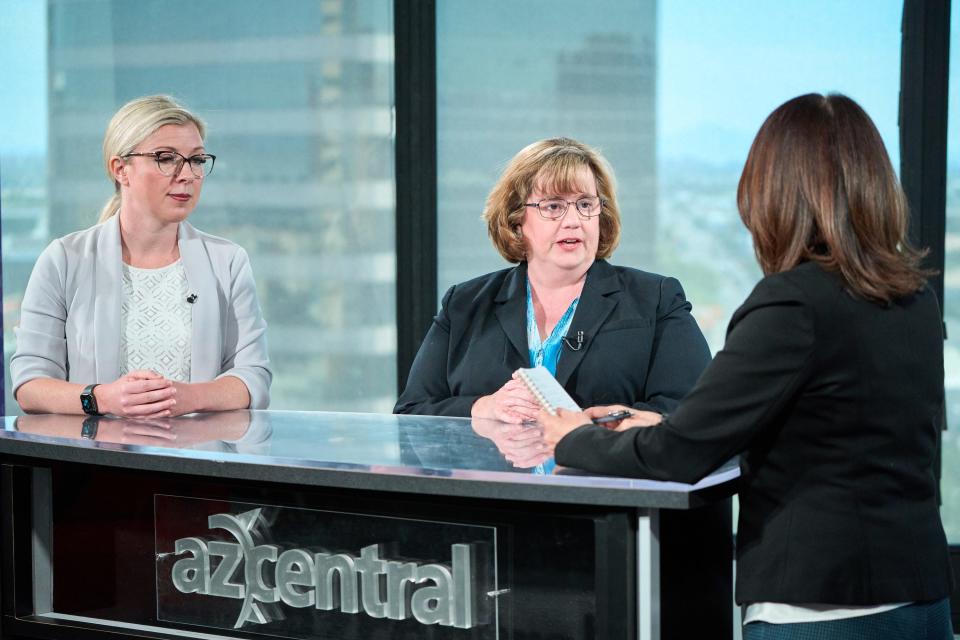Maricopa County attorney race becomes hotly contested

- Oops!Something went wrong.Please try again later.
The Maricopa County Attorney’s Office has shaped up into one of the hotter races of the upcoming November election, even though it's down ballot from bigger contests.
Two candidates, Democrat Julie Gunnigle, and Republican Rachel Mitchell are offering voters sharply contrasting approaches to the criminal justice system.
Voters will decide which of the radically different visions they want to shape an agency that prosecutes thousands of cases every year, the lion's share statewide. The contest comes at a time that attitudes about criminal justice reform, police violence, and how to adjudicate non-violent offenses are all being reexamined.
Prison tour: Arizona legislators toured Eyman state prison complex in Florence. Here's what they learned
Mitchell, the current county attorney, was appointed after the resignation of Alister Adel.
Adel’s departure triggered a special election to select who would serve out the remainder of her term, which ends on Jan. 1, 2025.
Mitchell has served as a bureau chief at the Maricopa County Attorney’s Office overseeing teams of prosecutors, notably the sex-crimes bureau. That experience led her to be tapped by the Senate Judiciary Committee to question witnesses during the hearing involving Supreme Court nominee Brett Kavanaugh in 2018.
Gunnigle has worked as a private practice attorney in the areas of civil and appellate litigation, administrative law and professional licensing. She was a prosecutor in Indiana between 2006 and 2007 and in Illinois from 2009 to 2011. Gunnigle previously ran for county attorney but lost to Adel in the 2020 general election.
While Mitchell touts more than 30 years of experience working in the agency she hopes to lead, Gunnigle, with more limited prosecution experience, has leaned into the outsider role, promising to reform what she has labeled as a corrupt institution.
The Maricopa County Attorney’s Office is one of the largest prosecutorial agencies in the country, employing more than 1,000 full-time positions. The agency received more than 50,000 cases for review from policing agencies in 2021.
Fundraising nearly tied
Third-quarter campaign finance reports are not due until Oct. 15, but both candidates reported large hauls during the primary election. Gunnigle raised nearly $245,000, slightly more than Mitchell's $243,000 in contributions. Campaign finance records ending in July show a majority of both Gunnigle and Mitchell’s fundraising came from in-state donors who gave more than $100.
Running unopposed in the primary allowed Gunnigle to save up for the fall election, but she still reported spending nearly $80,000. Mitchell faced a primary challenge in candidate Gina Godbehere for the Republican nomination, spending nearly all of what she raised. But a Mitchell campaign spokesperson said at the time Mitchell would have no problem raising that much money again, and then some, for the fall election. Independent expenditures will also likely play a large role in the race.
Both candidates boast multiple endorsements from state and local interest groups.
Mitchell has branded herself as the “police supported” candidate, receiving an endorsement from Arizona Fraternal Order of Police. Gunnigle is endorsed by NORML, National Organization for the Reform of Marijuana Laws, which she says is a first for a prosecutor’s race candidate, and reflective of her support for universal and automatic expungement for marijuana convictions.
Reform efforts within MCAO
Mitchell was one of five criminal division chiefs within the County Attorney's Office who wrote a letter to former County Attorney Alister Adel in February urging her to resign, citing ethical concerns over her continued sobriety and judgment.
During her tenure running the office, Mitchell pointed to an ethics committee that reviews reports of concern and complaints within MCAO and said “misconduct is not tolerated.”
Gunnigle said there is a lot of work to do at the county attorney’s office to “change the decades of corruption” that she blamed on Mitchell “and her mentors.”
She pledged to create a more transparent office and to “immediately rehire the dozens of experienced prosecutors who left due to chronic-leadership scandals and ineptitude, and begin building a culture of accountability that values prosecutors doing justice.”
Aside from former County Attorney Adel being scrutinized for her sobriety and absence from work prior to her resignation, the office has been plagued by scandals for years.
High profile prosecutor Juan Martinez was fired and disbarred in 2020 following years of sexual harassment allegations.
In 2021, investigations found the County Attorney’s Office collaborated with the Phoenix Police Department to trump up false gang charges against social justice protesters.
All of the charges against the protesters were eventually dismissed, several police officers were demoted, and another top prosecutor was fired as a result.
The County Attorney's Office was forced to drop 180 criminal cases in early 2022, after it forgot to file charges for more than a year.
At a media briefing on Wednesday, Mitchell confirmed a prosecutor was on leave for allegedly having a sexual relationship with a Department of Public Safety investigator.
Valena Beety, Deputy Director for the Academy for Justice at Arizona State University, called the Maricopa County Attorney a very powerful office with a huge responsibility to create public safety.
“There's been missteps in attaining that goal for many years now,” she said. “So it's important that leadership recognizes what has happened, and what's been going on in the office, and that whoever wins this race is ready to address those things.”
Abortion center stage
Gunnigle’s stance on abortion prosecution has been clear from the start of the campaign. The Democrat has repeatedly said she would not prosecute anyone involved in seeking an abortion, even going so far as to make it a campaign slogan: “Not now, not ever.”
Mitchell recently released a statement saying she would not prosecute women for having abortions, but this was an unnecessary declaration because state law does not allow for such a prosecution.
Mitchell has not ruled out prosecuting doctors or others who help facilitate an abortion, which became a possibility after the U.S. Supreme Court overturned Roe v. Wade in June. A Pima County Judge recently lifted an injunction on a territorial-era law that banned abortions except to save the life of a mother. The 1864 law prescribes prison terms for abortion providers. On Friday the Arizona Court of Appeals granted Planned Parenthood of Arizona's request for an emergency stay of the Pima County ruling, putting a hold on the territorial ban, pending the outcome of an appeal.

Incarceration and racial disparities
Mitchell said her office has increased offers for diversion programs — legal alternatives to incarceration for lesser crimes — under her leadership. Gunnigle said she would expand the use of specialty courts, such as veterans' courts, and move away from the practices of charge-stacking — charging defendants for several crimes from a single incident — and advocate against mandatory minimum sentencing, instead supporting more judicial discretion.
Addressing racial disparities in the criminal justice system, Mitchell said state law requires her to review cases submitted by police, but she is “committed to ensuring that an individual’s race or ethnicity should never be taken into consideration when charging a case.”
Gunnigle said she believes it is important for the county attorney’s office to analyze the root causes of systemic racism.
“We will invest in evidence-based diversion programs, use deflection practices, and work to end mandatory minimums that disproportionately imprison communities of color,” Gunnigle said.
The prison sell: Arizona changed how it sells prisoners to companies. The state raked in millions, but workers were neglected
With regard to Arizona prisons, Mitchell called the issue an “important distinction between the two candidates.
“While my opponent has staked out a radical position that prisons by their very nature are evil, I believe incarceration exists to punish the most serious offenses and protect public safety,” Mitchell said.
Gunnigle said that recent federal court action has shown Arizona prisons are failing to rehabilitate people, and she pledged to be a vocal advocate for independent prison oversight.
“When a crime warrants prison time, serving justice must be my primary objective,” Gunnigle said. “Nevertheless, when harm is more appropriately confronted by treatment and rehabilitation, I will ensure that taxpayer dollars aren’t being spent in a prison system designed to fail.”
Beety said prosecutors in Arizona have a history of charging low level offenses, such as simple possession of controlled substances, as felonies, and the Maricopa county attorney should look at other options than incarceration to address public safety.
“Prison is a short-term answer to much longer-term problems, like addiction and abuse,” she said.
As of October 6, 2022, there were 33,625 people incarcerated in state prisons in Arizona. The most recent available national data shows Arizona has one of the highest incarceration rates in the country.

Election guide: November 2022
City races | School boards | State | Governor
| Ballot measures | Federal races | How to vote
While the challenges before next Maricopa county attorney are daunting, Beety pointed to Chicago and Detroit as examples of places that have struggled with racial disparities in prosecutions, police violence, and backlogs in rape kits, but were able to move forward under bold leaders who were not afraid to confront the problems within their departments.
Beety is an expert on wrongful convictions. She said while County Attorney Mitchell has created a conviction review unit, it’s important for the eventual office holder to put more resources into that unit.
“It's important to have a department within the office that is open to looking at these cases, but also to recognize that people can falsely confess, particularly when they are in a coercive setting. There can also be faulty forensic evidence from our crime labs,” Beety said. “So there are things that can be done on the front end, to make the convictions more reliable if people are aware of the causes of wrongful conviction. I think that that's a very important thing for the forthcoming county attorney to be mindful of.”
Reporters Chelsea Curtis and Robert Anglen contributed to this story.
Have a news tip on Arizona prisons? Reach the reporter at jjenkins@arizonarepublic.com or at 812-243-5582. Follow him on Twitter @JimmyJenkins.
Support local journalism. Subscribe to azcentral.com today.
This article originally appeared on Arizona Republic: Maricopa County attorney becomes hotly contested election

